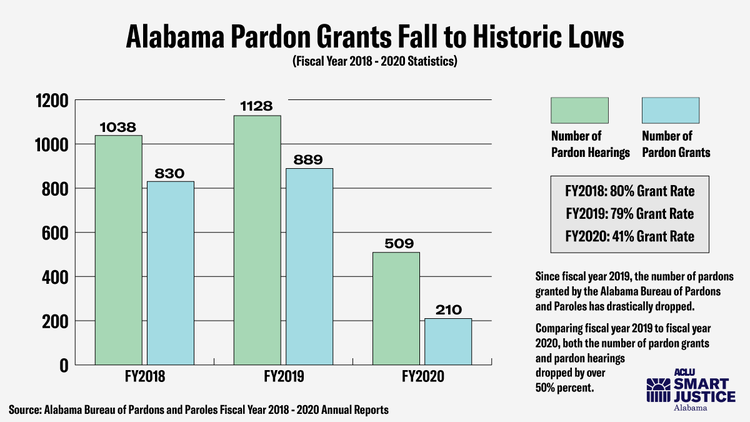Report: Alabama Pardons - Civil Rights Denied
ALABAMA’S BOARD OF PARDONS AND PAROLES REJECTS ALMOST 80 PERCENT OF PARDON REQUESTS, DENYING ALABAMIANS RESTORATION OF RIGHTS
BY BETH SHELBURNE, INVESTIGATIVE REPORTER, CAMPAIGN FOR SMART JUSTICE
A recent review of data from the Alabama Bureau of Pardons and Paroles reveals a precipitous drop in pardon grants under the current 3-member parole board. The board, led by former prosecutor Leigh Gwathney, has denied 78 percent of pardon applicants in FY 2021. This represents an unprecedented, historic drop in the number of pardons granted in Alabama.
According to results published on the ABPP website, out of 899 pardons considered between October 2020 and May 2021, the board granted only 199, or 22 percent. In FY 2020, 509 pardons were considered and 210 were granted, or 41 percent. In FY 2019, 1128 pardons were considered and 889 were granted, or 79 percent. In FY 2018, 1038 pardons were considered and 830 were granted, or 80 percent.
Since fiscal year 2019, the number of pardons granted by the Alabama Bureau of Pardons and Paroles has drastically dropped.
Based on year-to-date data, pardon grant rates for fiscal year 2021 reflect a record low for Alabama.
In Alabama, applying for a pardon is the only way to receive full restoration of civil and political rights after a criminal sentence is complete. This includes the right to vote and the right to own a firearm. Anyone who has completed their sentence or three successful years on parole is eligible for a pardon.
Efforts to learn why the board is denying record numbers of Alabamians full restoration of their rights reveal a lack of accountability and transparency.
Cam Ward, Director of the Bureau of Pardons and Paroles acknowledged the recent drop in pardon and parole grants but said the bureau has no say in how the board votes.
“The way the board is set up, they don’t tell us any reasons for their decision,” Ward wrote in an email response. “We get a spreadsheet at the end of each day and that is it.”
Questions about the recent drop in pardon grants were also submitted to ABPP’s communications director with a request to send them to board members, but they went unanswered. His email response simply referred to the data published on the website.
Linda Hutchinson Swain of Pike Road is one of hundreds of Alabamians denied a pardon in 2021. Swain hired an attorney to help her apply for the pardon and said she spent close to $4000 in the process. She wanted a pardon to improve her employment options and to restore her voting rights.
In 2010, Swain completed a substance abuse program during the few months she spent in prison for theft and breaking and entering of a vehicle. She said her crimes were connected to cocaine use she began while going through a divorce. After prison, she spent several years on community corrections and graduated early due to excellent compliance with the rules. She’s been drug-free and off supervision for a decade.
“I have no idea why they denied me,” she said. “I’m so disappointed. I honestly thought I had a good chance. I’ve proved to everybody that I’m better. It feels like them saying we’re just not ever going to forgive you for this.”
Montgomery-based attorney Andrew Skier represented Swain and others in recent pardon requests that were denied, including former drug offenders who are completely recovered. Skier said he’s been practicing before Alabama’s pardon and parole board for 23 years.
“We’re used to the pendulum swinging back and forth within a certain range, but I’ve never seen anything like this,” Skier said. “It’s like we’re red lining in one direction. I don’t understand the purpose in denying these people. I don’t understand how someone who calls themselves a Christian can put their name behind this.”
Laws governing oversight, accountability and transparency surrounding Alabama’s board of pardons and paroles are severely lacking. The board operates with full discretion on granting pardons. There is no internal rule or list of criteria that the board must consider. The board is not obligated to disclose anything about why it denies a pardon and applicants have no way to ask for a review or appeal a decision.
Beth Shelburne is an investigative reporter for the Campaign for Smart Justice with the ACLU of Alabama. For investigative reporting on Alabama’s prison and pardons & paroles systems, follow her on Twitter at @bshelburne.


